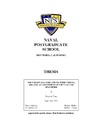Growing Nonproliferation Challenges in Southeast Asia: Forecasting Emerging Capabilities and their Implications on Control of Sensitive WMD-related Technologies
| dc.contributor.author | Center on Contemporary Conflict | |
| dc.contributor.author | Lieggi, Stephanie | |
| dc.date.accessioned | 2015-06-17T22:25:57Z | |
| dc.date.available | 2015-06-17T22:25:57Z | |
| dc.date.issued | 2015-05 | |
| dc.identifier.uri | https://hdl.handle.net/10945/45430 | |
| dc.description | Performer: Middlebury Institute of International Studies Project Lead: Stephanie Lieggi Project Cost: $76,000 FY15-16 | en_US |
| dc.description.abstract | Objective: As the economies of Southeast Asia advance, so too does the risk of WMD proliferation. Regional governments are not fully cognizant that these growing capabilities mean their domestic industries will be seen as potential second-tier suppliers by proliferators. This project aims to answer two key questions: 1) How will the availability of dual-use commodities develop in Southeast Asia in the next decade? 2) What can be done at the domestic, regional, and international levels to establish sustainable frameworks to keep the region from becoming the next major proliferation challenge? This research can help identify the most problematic sectors in the near- to medium-term to effectively allocate limited resources to combat the spread of WMD-related commodities. | en_US |
| dc.description.sponsorship | PASCC | en_US |
| dc.language.iso | en_US | |
| dc.publisher | Monterey, California: Naval Postgraduate School | en_US |
| dc.title | Growing Nonproliferation Challenges in Southeast Asia: Forecasting Emerging Capabilities and their Implications on Control of Sensitive WMD-related Technologies | en_US |
| dc.type | Report | en_US |





